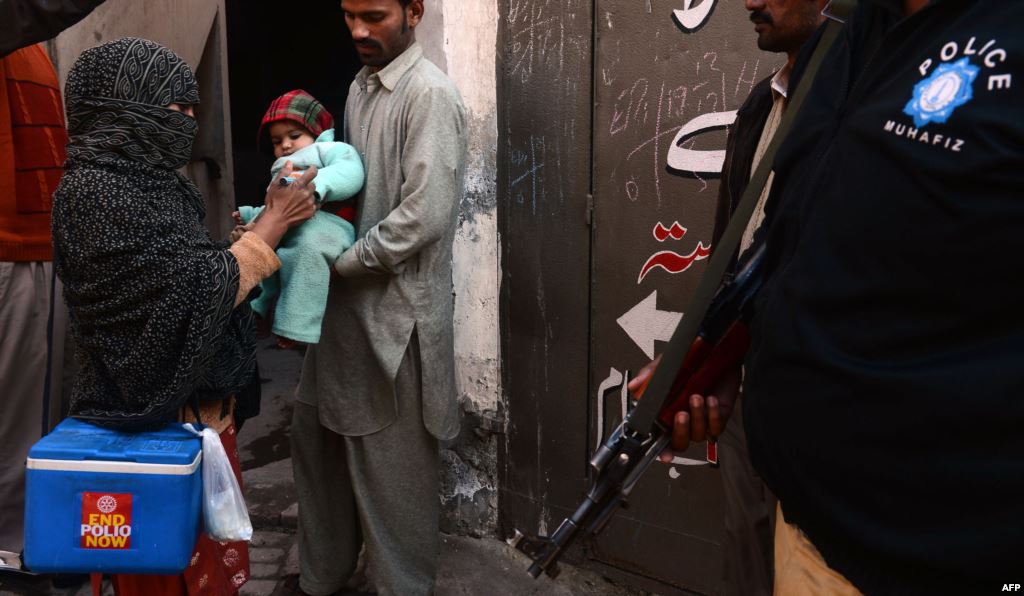Blast Near Pakistan Polio Centre Kills 15
Pakistan's polio crisis

NEW DELHI: A blast near a polio vaccination centre in Quetta, Pakistan killed 15 people and injured a dozen others on Wednesday.
Among the dead in Wednesday's attack in the city of Quetta were 13 policemen and a paramilitary trooper, said Balochistan province Home Minister Mir Sarfaraz Bugti.
The attack was claimed by both the Tehreek-i-Taliban Pakistan (TTP) and a splinter group, Jundallah. It took place in the morning as polio workers and security staff were reporting for duty before heading out on their vaccination rounds, said Sarfaraz Bugti, a minister in Balochistan province, as quoted by the BBC.
Shabir Ahmed, a police officer who survived the attack but suffered shrapnel wounds in his stomach, hands, legs and feet, told the AFP that the team had been preparing to leave for various neighbourhoods around Quetta in Balochistan province when they were hit. "Suddenly there was a loud bang and I fell to the ground, I could not see anything, there was dust everywhere… Then I heard people screaming and sirens of ambulances.”
Attacks like Wednesday’s attack on polio workers in Pakistan is one of the reasons why polio continues to a pose a threat in the country, even as it has been eradicated from the rest of the world (barring Afghanistan). Pakistan in fact is the only country where polio is on the rise, although 2015 saw some success in terms of numbers compared to 2014.
The biggest challenge comes from threats to the security of polio workers. Between 2012 and 2014, 74 polio workers were killed by militants -- who are opposed to the administration of the vaccine. This violence and resistance contributed to a resurgence of polio across Pakistan, making the country the only country in the world where polio was on the rise. 2014 in fact was the worst year yet, with 306 polio cases, i.e, four times as many cases of polio as compared to 2013.
2015 saw an improvement, but the fight against polio is far from over. In December, two more children, belonging to Pashtun families from Baldia Town, Karachi, were diagnosed with polio, taking the total number of polio cases in the country above 40 for 2015.
The World Health Organisation has referred to Pakistan as the “greatest single risk to the achievement of global polio eradication.” In a report, the international health body said that Pakistan is responsible for 80 percent of the polio cases reported across the globe.
“The situation is primarily due to a lack of access to children for vaccination, largely owing to a continuing ban on immunisation imposed by militants in the North and South Waziristan, and insecurity and killing of polio workers in the field,” the report said.
In 2014, a new strain of polio was identified in Pakistan, with WHO warning that Peshawar has the world’s largest reservoir of the polio virus and that 90 percent of Pakistani polio cases were linked to this highly contagious strain of the disease which is found in Peshawar’s sewers.
The attacks against polio-workers in Pakistan escalated once it became known that the CIA had paid a Pakistani doctor, Shakil Afridi, to fake a vaccination campaign in Abbottabad, to acquire DNA samples from children inside a compound where al-Qaeda leader Osama bin Laden was based. The American intelligence’s scheme, in a bid to prove that bin Laden was in Abbottabad, involved comparing the DNA samples of the children to those of bin Laden’s sister, who had died in Boston in 2010.
This incident exacerbated the distrust of foreign intelligence services in Pakistan, and the Taliban have waged an all-out war against polio workers, repeatedly attacking health teams and denouncing vaccinations as part of a larger western/CIA agenda. The Afridi incident did grave damage to the credibility of the healthcare programme in Pakistan, which has seen previous success as polio figures declined from 350,000 to 250 in a span of twenty-five years.
The CIA came under widespread criticism for jeopardizing the campaign. InterAction, a coalition of 200 non-governmental organisations, issued a statement reading: "The CIA's use of the cover of humanitarian activity for this purpose casts doubt on the intentions and integrity of all humanitarian actors in Pakistan, thereby undermining the international humanitarian community's efforts to eradicate polio.”
The distrust was fuelled by conspiracy theories that claim vaccinations are “un-Islamic” or an American ploy to sterilise children. The practice of marking houses that have been vaccinated, in order to differentiate them from houses that are still to be included in eradication efforts, was beset with rumours that vaccinators - accused of being CIA operatives - mark houses to be targeted by US drones.
The Taliban imposed ban on immunization has deprived about 170,000 children under the age of five from receiving polio vaccinations. The WHO states that Pakistan had almost 300 cases of polio in 2014, compared to 91 cases in 2013 and 58 cases in 2012, with many attributing the attacks on polio campaigns which have resulted in the lack of access to people in need of vaccinations as a key reason for this increase.
“Issues involving children’s access to immunisation and safety of vaccinators must be resolved to ensure that the programme can be completed,” the WHO report said.



